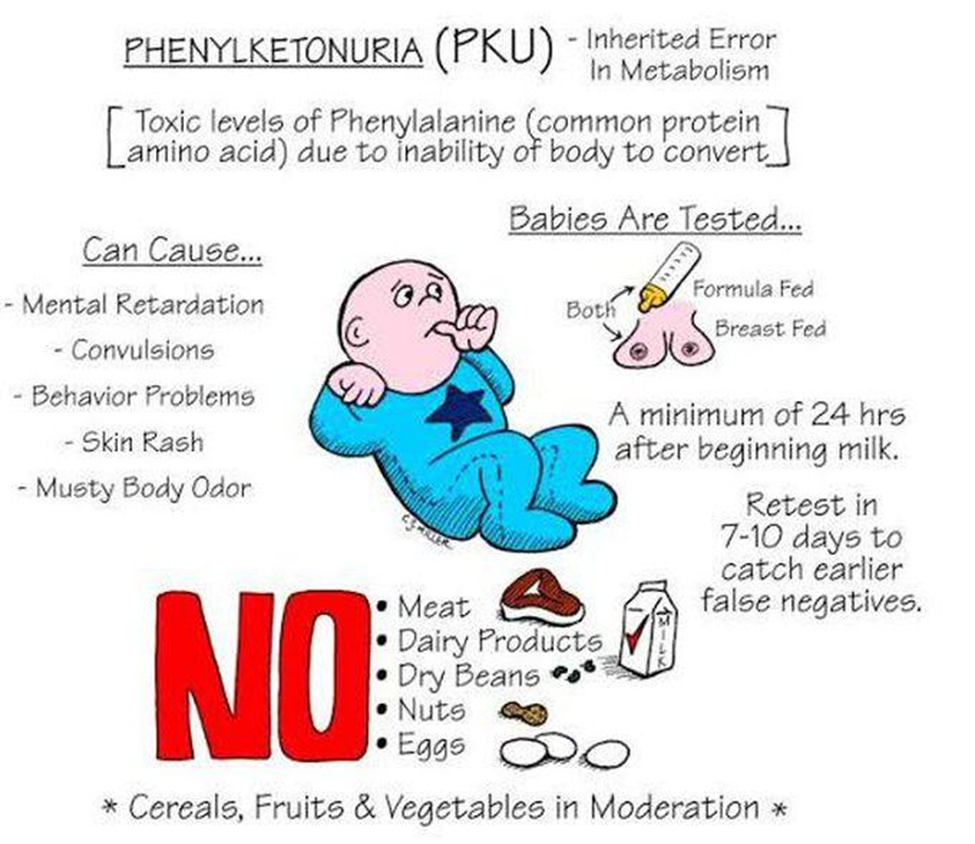A parent brings a 2-week-old infant to a clinic for a phenylketonuria rescreening blood test. The test indicates a serum phenylalanine level of 1 mg/dL (60.5 mcmol/L). The nurse reviews this result and makes which interpretation?
It is inconclusive
it is negative
it requires rescreening at age 6 weeks.
It is positive
The Correct Answer is B
A. It is inconclusive
Explanation: A serum phenylalanine level within the normal range is considered conclusive in ruling out phenylketonuria. Inconclusive results typically occur when there are issues with the sample or testing process.
B. It is negative
Explanation:
A serum phenylalanine level of 1 mg/dL (60.5 mcmol/L) in a 2-week-old infant is within the normal range. In the context of phenylketonuria (PKU) screening, a "negative" result means that the phenylalanine levels are within the expected range, and there is no evidence of phenylketonuria.
C. It requires rescreening at age 6 weeks.
Explanation: If the initial screening result is within the normal range, rescreening at age 6 weeks may not be necessary for phenylketonuria. The timing and need for rescreening may vary based on local protocols and individual patient factors.
D. It is positive
Explanation: A positive result for phenylketonuria would indicate that the serum phenylalanine levels are elevated, suggesting a potential diagnosis of PKU. In this case, the result is negative, meaning there is no evidence of PKU.

Nursing Test Bank
Naxlex Comprehensive Predictor Exams
Related Questions
Correct Answer is D
Explanation
A. 1 cup cooked rice: This exceeds the 1 oz serving size and is more than what the nurse is recommending.
B. Flour tortilla: The size of a flour tortilla can vary, but it often exceeds the 1 oz serving size, so it may provide more than the recommended amount.
C. 1 cup ready-to-eat cereal flakes: The volume of cereal can vary, and 1 cup of cereal may provide more than 1 oz of grains, depending on the type and density of the cereal.
D. 1 slice whole wheat bread: A standard slice of whole wheat bread typically provides around 1 oz of grains, making it an appropriate choice for the recommended serving size.
Correct Answer is ["800"]
Explanation
The Parkland formula is commonly used to calculate the fluid requirements for burn resuscitation. The formula is:
Fluid requirement (in mL)=TBSA×Weight (in kg)×Fluid volume (in mL/kg)
For burn patients, the recommended fluid volume is typically 4 mL/kg for each percent of TBSA burned.
Let's calculate the fluid requirement for the given case:
Fluid requirement=40%×22 lbs×4 mL/kg
First, convert the weight from pounds to kilograms:
Weight (in kg)= Weight (in lbs)/2.2
Weight (in kg)=22 lbs/2.2≈10 kg
Now, calculate the fluid requirement:
Fluid requirement=40% x 10 kg × 4 mL/kg
Fluid requirement=1600mL(totalfluidover24hours)
Fluid for the first 8 hours:
1600/2=800ml
Thus, the child will receive 800 mL of fluid in the first 8 hours after the burn injury.
Whether you are a student looking to ace your exams or a practicing nurse seeking to enhance your expertise , our nursing education contents will empower you with the confidence and competence to make a difference in the lives of patients and become a respected leader in the healthcare field.
Visit Naxlex, invest in your future and unlock endless possibilities with our unparalleled nursing education contents today
Report Wrong Answer on the Current Question
Do you disagree with the answer? If yes, what is your expected answer? Explain.
Kindly be descriptive with the issue you are facing.
